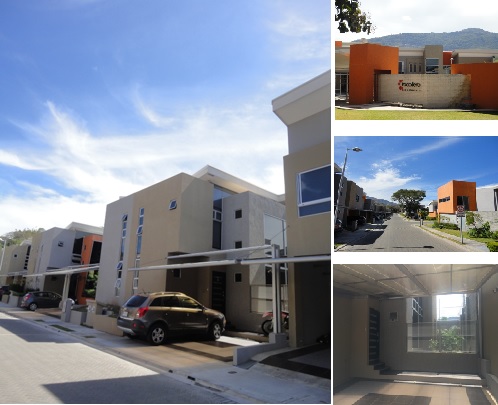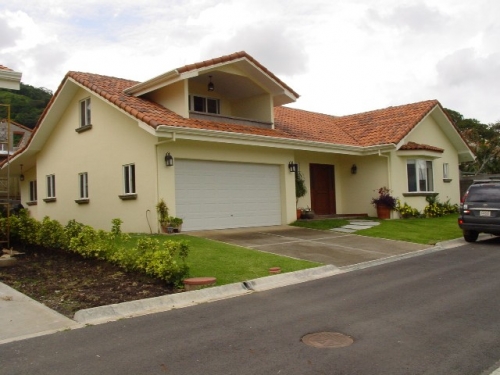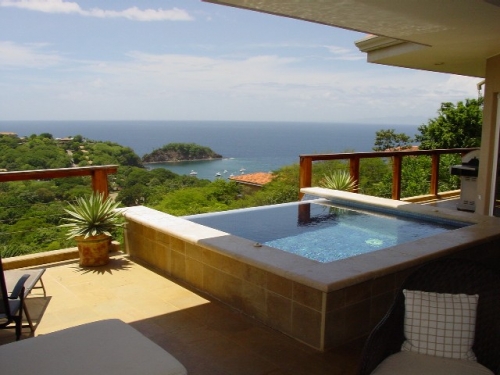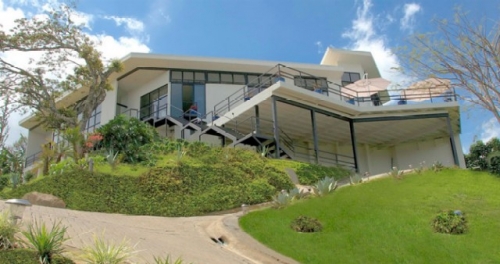Costa Rica Guide
Costa Rica Real Estate
List your property today!
Inclusion of real estate listings at Costa Rica Guide is
absolutely free of charge.
Featured Properties
Costa Rica Guide - Costa Rica Real Estate
FAQs - Real Estate Information
Buying property in Costa Rica can certainly have its pitfalls and nearly all experts recommend to purchase turnkey real estate. Below are some answers to frequently asked questions about the purchase and transfer of property in Costa Rica.
How is title transferred?
In Costa Rica, property is transferred from seller to buyer by executing a transfer deed (escritura) before a notary public. Unlike common law countries, such as the United States and Canada, where the role of the notary is limited to authenticating signatures, in Costa Rica the notary public has extensive powers to act on behalf of the state. The notary public must be an attorney and she or he may draft and interpret legal documents, as well as authenticate and certify the authenticity of documents.
In order to close on the property, the buyer and seller must select a notary/attorney who will draft the transfer deed and register the sale in the Public Registry (Registro Nacional). the local custom is that the buyer may select his or her notary/attorney to draft the transfer deed if paying cash for the property. If the purchase price is financed, there are generally three alternatives for selecting the notary/attorney.
1. If a large percentage of the purchase price is being financed by the seller and a mortgage needs to be drafted to guarantee payment, then the seller may request that her or his notary/attorney draft the transfer deed.
2. If a property is purchased 50 percent cash and 50 percent financed, it is common for the buyer's attorney and seller's attorney to jointly draft the transfer deed and mortgage in a single document. This is known as co-notariado.
3. Finally, the buyer may insist that his or her notary/attorney draft the transfer deed and let the seller's notary/attorney draft a separate mortgage instrument. In this case, because the mortgage is being drafted separately, it carries a higher registration fee. The registration fees are discussed below in the section on closing costs.
At your option, the property can be purchased in an individual's name, jointly with other persons, or in the name of a corporation. the decision as to ownership should be based upon your particular situation and after consultation with your attorney.
How can I ensure that I have clear title to the property?
Costa Rican law requires that all documents relating to an interest and/or title to real property be registered in the property section of the Public Registry (Article 460 of the Civil Code). Most properties have a titled registration number known as the folio real, and the records database can be searched with this number or by name index. The Public Registry report (informe registral) provides detailed information on the property, including the name of the title holder, boundary lines, tax appraisal, liens, mortgages, recorded easements, and other recorded instruments that would affect title.
Since Costa Rica follows the doctrine of first in time, first in right, recorded instruments presented to the {Public Registry are given priority according to the date and time in which they are recorded. Obviously, every situation differs and in some cases a review of the Public Registry record will not be enough to uncover all encumbrances. That is why it is important that the buyer have her or his own attorney conduct an independent title search and investigation rather than rely on the seller's attorney.
How about closing costs?
The general custom is for the buyer and seller to share equally in the closing costs. this can be modified by agreement and usually depends upon the particular transaction. Closing costs involve three things: government taxes and fees, notary fee, and mortgage costs, if any.
Government taxes and fees. This includes a real estate transfer tax of 3 percent; a registration fee of 0.5 percent; and documentary stamps (agrarian, hospital, municipal, bar association, national archive and fiscal stamps) totaling approximately 0.55 percent.
Notary fees. the notary who drafts the transfer deed is entitled by law to charge 1.50 percent of the first one million colones of the sales price, and 1.25 percent on the balance.
Mortgage costs. It is customary for the person who is receiving financing to pay the costs of drafting and registering the mortgage instrument. A mortgage can be created simultaneously at the time of sale by adding a mortgage clause in the transfer deed. Or, a separate mortgage instrument can be drafted. both have separate costs. A mortgage within a transfer deed pays registration fees of 0.25 percent in registration fees and approximately 0.53 percent in documentary stamps. The notary will also charge for drafting the mortgage instrument and that fee can range from approximately 0.525 percent to 1.25 percent of the amount of the mortgage, depending on the circumstances involved.
The buyer should be aware that Costa Rican real estate transactions commonly operate on a two-tiered system. since Costa Rican properties have a low property tax appraisal base in relation to market value, it is a customary practice to run property sales through at the registered value, which may be substantially less than the actual sales price of the property. In such a case, all transfer taxes and fees discussed above would apply to the registered value as opposed to its sales price, with the exception of the notary fee. Buyers should consult their attorney about the potential risks of this practice.
Registration of the transfer deed.
Once all the fees have been paid, it is the obligation of the notary who drafted the transfer deed to ensure that the deed is presented (anotado) and registered (inscrito) in the Property Section of the Public Registry. I have stressed the words presented and registered to highlight the importance of following up with the notary to ensure registration. Although presentation guarantees your priority (i.e., first in time, first in right), it does not automatically guarantee registration. The Public Registry will not register a transfer deed unless all taxes and registration fees are included; a certified copy from the Finance Ministry (Ministerio de Hacienda) is provided certifying that the seller's property tax (impuesto territorial) payments are current; and a municipal certification is provided from the municipality where the property is located certifying that both buyer and seller are current on municipal tax payments. Likewise, any prior instruments that encumber the property (i.e., mortgages, liens, judgments, etc.) must be lifted before your transfer deed will be registered.
Once a transfer deed is accepted for registration, the Public Registry will return the original document with all the documentary stamps affixed to it and properly sealed. Assuming no defects in the transfer deed, it should be registered by the Public Registry with 45 to 60 days after presentation. It is therefore important to follow up with the notary to ensure registration, otherwise you will run into problems in the future when you decide to resell the property and find out that your sale was not registered.






